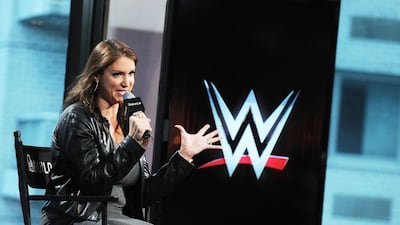Stephanie McMahon, 40, is chief brand officer for WWE (World Wrestling Entertainment), a US$1.65 billion entertainment business led by her father, Vince McMahon, its chairman and chief executive, and previously her mother, Linda, who is now part of the Trump administration. The family has evolved WWE from staging live professional wrestling into a global entity with revenue from TV broadcasting, films, music, video games and product licensing. Ms McMahon worked her way up from modelling WWE merchandise as a teenager and working as an intern in most departments before becoming a champion wrestler and TV presenter. She was in Dubai recently as guest speaker for the Dubai Business Women's Council, to announce a WWE tour visiting the UAE and a new Arabic language wrestling show in collaboration with OSN.
What does the job of chief brand officer involve?
Everything. I have the privilege of supporting all our lines of business, from a growth and revenue perspective. I’m responsible for overall brand image, helping build positive brand perception all over the world. It’s important to have diversity in every aspect of business and that’s true for my team … diversity and bringing in expertise from all levels and all fields is vital and crucial.
Was your goal to be a wrestler or businesswoman?
When I was a little girl I wanted to be part of the family business. They were building this from scratch. I wanted nothing more than to be with them. I’ve always been a natural ham, in the school plays. And I always saw myself on the business side. I never saw myself as a performer. When that opportunity came I loved having both worlds.
Do outsiders recognise WWE as needing to be a business to thrive?
Any successful entity has a successful business behind it. For the most part people recognise that. When my father and my mum, Linda, took it over they really made it into the global phenomenon it is. That took an awful lot of hard work and entrepreneurship.
Did you have to prove yourself in the ring to inform your management role?
I don’t think the performance aspect needed to come first necessarily. It certainly provided me with a great skill set, especially in terms of conflict resolution. On the road not only was I a performer, at one time, I was directing, producing and writing our programming. I was working with all our stars, managing those different personalities and trying to illicit the best performances, which is no different in management.
Was it tougher or easier rising from receptionist to boardroom in a family business?
I have to prove myself every day, no different to anybody else, if not more so. I did work reception, work pretty much at intern level in every department, model merchandise when I was a kid. That was part of my growth and very strategic on my parents’ part, wanting me to be exposed to every aspect of the company. I started working in sales straight out of college and on television at the same time and working in our creative writing department. It was always a goal if I proved myself I would take over as manager. There was a lot of trial by fire.
Gender is supposed to be now irrelevant in the business environment but does that also apply in the seemingly macho world of WWE?
Business performance, performance of any kind, the proof is in the pudding and cream rises to the top. It’s the end result, the final product that matters and if it’s a woman delivering those results or a man it really doesn’t matter. I’ve never seen it as a barrier. My mum was chief executive of our company. I’ve always seen women in leadership positions and I grew up in a male-dominated environment, surrounded by men, who also supported me. That’s not to say I didn’t go toe to toe with them. I’ve wrestled my brother since I can remember; he’s seven years older and quite a lot stronger so I had to out smart him. I’ve never been intimidated by men. I’ve been more intimidated by women in business.
WWE seems the most American of entertainment yet is loved in the Middle East. How so?
We’re in 180 countries, 20 different languages; we appeal to so many different cultures. It gets back to that notion of storytelling, good versus evil. Storytelling is how we as human beings have communicated for centuries, because it’s relatable. That is what endures. It is protagonist versus antagonist with conflict resolution but our resolution is in the ring. The in-ring product is heavily influenced by audience; if they’re not reacting the way they should to what is happening in the match our performers change gear. It’s a lot of improv.
There's talk of WWE-themed businesses including retail/family entertainment destinations in the Middle East.
We are looking to expand across multiple lines of business. We want to replicate our business model, here in the ME and everywhere else.
business@thenational.ae
Follow The National's Business section on Twitter

